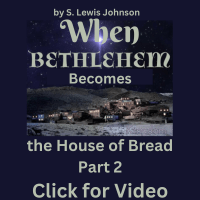
The prophecy of Micah is a beautiful portrayal of the work of the Messiah. He is to be a “Governor,” a title that involves three things:
First, He shall be the Messianic Prophet, who shall guide His people in the way (cf. Luke 1:79).
Second, He shall be the Messianic Priest, who shall feed His people by virtue of the sacrifice He shall offer (cf. Micah 5:4, “feed”). They shall be led and fed.
Third, He shall be the Messianic King, who shall guard His people in the way (cf. Jeremiah 30:21). All of these functions are in the realm of His humanity, for it is “out of thee,” that is, the earthly Bethlehem, that He comes.
But, lest we think of Him only as an earthly sovereign, the prophecy in Micah adds the final description of Him, “whose goings forth have been from of old, from everlasting.” “Out of thee” points to His earthly side, but this points to His heavenly side. He is David’s Son, but He is also David’sLord.
Some years ago a moderator of the General Assembly of the Church of Scotland, after listening to Sir Bernard Lovell tell the assembly of the astronomer’s immensities, thanked him at the conclusion of his lecture, adding, “But we believe that our God rules over all your worlds.” How true that is. Herod may, indeed, be called, “the king” (v. 1), but the royal child rules his world. 1
The council of the theologians illustrates the difference between orthodoxy and life. They know the Scriptural answers, but have no interest at all in the realities of the King, His person and work. And as for Herod, he is a dangerous, but ludicrous illustration of the irrationality of malevolent unbelief. “He believes the Messiah is to be born in Bethlehem,” as Maclaren points out, “and yet he determines to set himself against the carrying out of what he must, in some sense, believe to be God’s purpose. ‘If this infant is God’s Messiah, I will kill Him,’ is surely as strange a piece of policy gone mad as ever the world heard of.” 2
The request of Herod (2:7-8). After the meeting with the Sanhedrin the scheming king called a second secret meeting with the wise men, in which he concealed his real intention, the murder of the King. He feigned a deep interest in the things that interested the wise men, assuring them that he wished to worship Him, too. The wise men, thus, become unwittingly the CIA, the spies, of the wicked despot. But the God who rules over all His worlds will overrule the enmity of this little puppet.
The Adoration Of The Wise Men (2:9-12)
The guidance of the star (2:9-10). The reappearing star becomes again the guide of the dedicated seekers, and the end of the search is near at hand. A great deal of discussion has taken place over the nature of this guiding star, but the statement of verse nine seems to say that the guidance of the star was miraculous. It truly did guide them, although they were given help from Herod through the answer of the chief priests and scribes. In fact, special revelation (Micah’s prophecy) and general revelation (the star) unite in pointing to Bethlehem.
“There is a lovely legend,” Barclay reminds us, “which tells how the star, its work of guidance completed, fell into the well at Bethlehem, and that it is still there and can still be seen sometimes by those whose hearts are pure.” 3
The gifts to the King (2:11-12). Discovery leads to adoration and offering. The depth of the faith of the wise men is not explicitly told. It is common to say that they could hardly have come to a knowledge of His true character. On the other hand, having been in the city of Jerusalem in contact with many of the chosen nation, and probably with many of their Scriptural experts, it would not be incredible that, guided by the Holy Spirit, they should have come to a faith in the greatness of the Messiah whom they had been discussing, and with whom they had been involved for so many months.
At any rate, having entered the house — evidently some weeks had elapsed since the birth and the babe had been removed from the manger to a more substantial dwelling 4 — they finally see Him. The child is mentioned first, customary in this narrative (cf. verses 11, 13, 14, 20, and 21), for He is the object of the main interest, the center of attraction.
The gifts are laid before Him in token of esteem and worship, and the scene is suggestive of all the great prophecies of the Old Testament which speak of the worship by the Gentiles of the great Messianic King at the inception of His future kingdom (cf. Psalm 72:10, 11, 15; Isaiah 60:6). The meaning of the gifts is not ascertainable with any certainty. Commonly they have been thought to represent His royalty, His divinity, and His mortality as seen in His sufferings for our redemption. If the meaning of the myrrh is related to His death, then the shadow of the cross is already falling over His face.
Conclusion
As we bring this study to a close, several thoughts come before us.
In the first place, we reiterate one of our opening remarks. Bethlehem means the house of bread, but only by the coming of the Child does it attain to the significance of its name. Then, finally, she becomes Bethlehem through Him who later shall say, “I am the living bread that came down from heaven; if any man eat of this bread, he shall live forever; and the bread that I will give is my flesh, which I will give for the life of the world” (John 6:51; cf. verses 27, and 35). We have tried Sinai, with its “thou shalt’s,” and “thou shalt not’s,” but the Law cannot give life. It can only condemn. Bethlehem, however, satisfies through Him. Brooks was right.
“The hopes and fears of all the years
Are met in thee tonight.”
And the aim of the evangelist is accomplished in the setting forth of the acknowledgement of Christ as King by both Jew, through the royal family, and Gentile, through the learned Eastern pilgrims. He is revealed, as Paul, too, puts it, “to the humble and untaught first, and then to the honorable and learned, to the poor first, and then to the rich, to the West first, and then to the East.5
In the second place, the response and reaction of Herod, the chief priests and scribes, and the wise men illustrate three common reactions to the Son of God today. There is, first, the reaction of Herod, the man who believes, evidently against his will, and sets himself to erase the testimony to the King, if at all possible. It is the insane reaction of a man who suppresses in unrighteousness the truth that he has.
There is, second, the response and reaction of the chief priests and scribes. It is the response of superior knowledge, but complete indifference. They are quite sure, as Maclaren indicates, “where Messiah is to be born; but they do not care to go and see if He is born.” 6
And, third, there is the reaction of the wise men, the reaction of adoring worship. Spiritual knowledge comes to its climax in the bowing of the head and heart in the presence of the King. May we respond in the same spirit, in the spirit of the Christmas hymn,
“O come, let us adore Him,
O come, let us adore Him,
O come, let us adore Him,
Christ, the Lord.”
But can the Babe really grant us the life that is life indeed? Can He bestow the bread that satisfies? Is the giving of eternal life within His power? There is a clue to the answer to the question in the last lines of the prophecy of Micah. His goings forth have been “from of old, from everlasting.” He is no newcomer to the human scene. In the theophanies of the Old Testament He ministered to His ancient people that they might be prepared for and not surprised by His incarnation.
“Veiled in flesh the Godhead see;
Hail th’ Incarnate Deity.”
He is no blind guide into the unfathomable abyss of the Beyond. He has been there! He can be trusted.
1 Tasker for discussion of the use of the Old Testament passage here (p. 39).
2 Maclaren, I, 24.
3 Barclay, I, 22.
4 Cf. Tasker, p. 38.
5 Ibid., p. 40.
6 Maclaren, I, 24.

Leave a comment